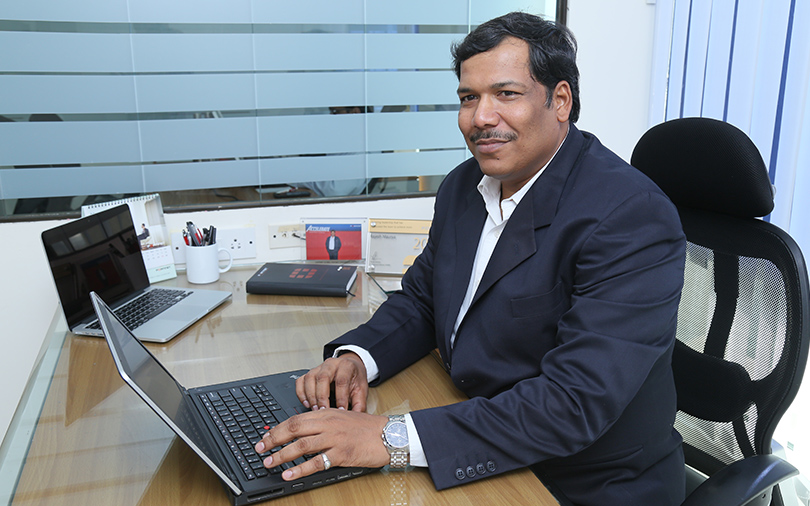
Indian companies have doubled cybersecurity budget: Fortinet's Rajesh Maurya


Founded in 2000, network cybersecurity firm Fortinet Inc. has clocked spectacular growth, with its global revenue more than doubling in the past four years to $1.8 billion in 2018. The California-based network security solutions company, founded by brothers Ken and Michael Xie, competes with the likes of Cisco, Palo Alto Networks and SonicWall. The company owes its success mostly to the rapid adoption and movement to the cloud firewall security, apart from its focus on small and medium enterprises.
Rajesh Maurya, Fortinet’s regional vice-president for India and South Asian Association for Regional Cooperation, spoke with TechCircle on the company’s growth in the country, especially in the public sector. He also spoke about how the company is working with cloud players in the increasingly competitive but growing market. Edited excerpts:
What do you see in the Indian market? What is the customer expectation?

We are fully into network security globally as well as in India. We are working towards protection using artificial intelligence and machine learning. We are talking about automating security and a secured enterprise network, a secured Internet of Things (IoT) environment for all industries in general and manufacturing industry in particular, increasing cloud security, protecting application deployment and data centre.
We have a specialised solution for every segment of the market, whether it has to do with the service provider or a specific requirement that the customer might have. It could be on the application side, network side or on the mobility side.
Could you tell us about the company’s growth in India?
We are growing at a high pace globally, with our revenue growing 20% and billing growing 22% last year. We have become closer to a $2 billion company now. Our expectation of growth from all the markets is similar. We would like to achieve 25% growth and grow our market share, especially in the large billings or deals space.

The rate is similar to the global range while some verticals, like the government, have grown faster. These include the deals we have got in sectors like government, banking and financial, hospitality, healthcare and retail.
India is a strong and large market. I cannot give you specific figures. We have been targeting each of these industries with specific solutions and meeting customers' expectations like firewalling the existing data and network while also providing a wireless network security.
We are seeing high growth in the manufacturing vertical in India. Earlier, the budgets for security were 5-6% of the overall IT spend, which has grown to 10-12% now, depending upon the industry environment.

When customers move to cloud, is there a tendency to stick to the cloud players’ solutions? Does that tend to squeeze independent players like you?
Security is a niche and specialised market. A paid customer will look at it in a different way. The role of a chief information officer is changing. A CIO is now thinking broadly and going with a non-specialised solution could become challenging. Every environment and customer is different and the data they are trying to protect is different, whether it is cloud, hybrid or private model.
The cloud security is still not mature, especially that provided by the cloud players themselves. The enterprises would want to have access to their own reporting and security platform – a third-party platform that they are confident of, a platform that has a whole lot of security professionals working and developing specific solutions round the clock.

In India, I have seen customers very hesitant to give the whole security to the cloud platform. Most enterprises don’t host all their applications on the cloud. A lot of these enterprises already have a third-party security provider, which they tend to maintain even when they move to the cloud.
Is there a global strategy that you follow to grow fast by working with these cloud platforms and system integrators, which work with large enterprises?
When we talk about the Fortinet platform, it is about being able to work with multiple platforms like Azure, Amazon Web Services or Oracle as well as from an integration standpoint. A lot of our users are already on these platforms. It is a software and we have virtualised our solutions for large enterprises. We also have experience of working on Cisco and RedHat platforms.

More than 85% in India are still using their own data centres and servers. Many of them -- especially large enterprises -- are still looking at moving only a part of their data and applications to the cloud.
What is the role of the research and development (R&D) office or the tech team in India?
We have two R&D centres in India. The Bengaluru centre works on the secure wireless network and our Hyderabad centre has developed the logic for some of our solutions. We have more than 300 people in India across all our offices.
How do you see the competition?

We have multiple solutions and we compete with multiple players. I don’t see a direct competitor because of the type of solutions we have. In the firewalling space, there are Checkpoint, Cisco and Palo Alto among the major ones. On the wireless side, we have Aruba. Some of them operate in enterprise while some are in the SME space like SonicWall.
